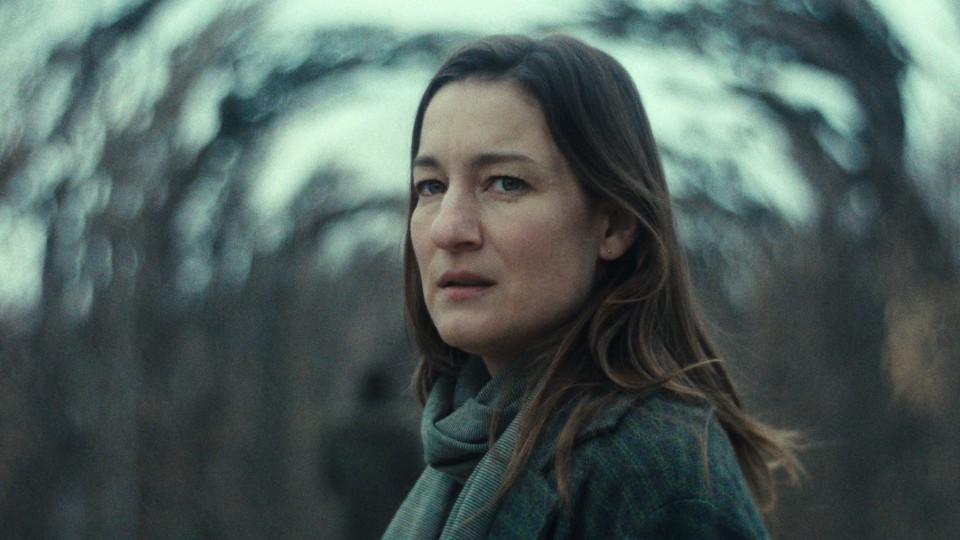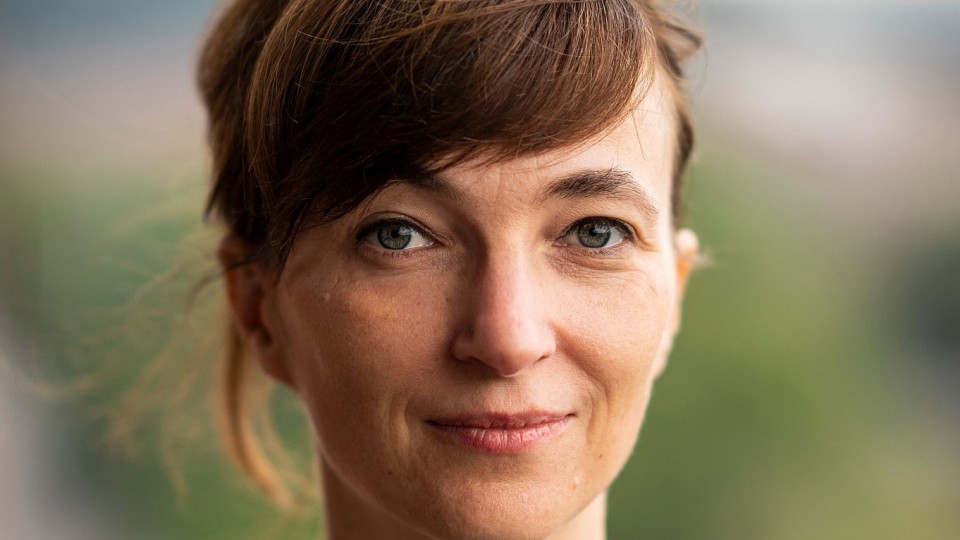Julia would appear to have achieved it all by the age of 40: artistic success, a gratifying relationship, a chic home. However,
to attain perfection as a woman she still needs one more thing – at least, according to the world around her: to be a mother.
Julia decides to take the plunge
and experiences alienation and disillusionment during and after giving birth. In MOTHER'S BABY, Johanna Moder dares to question and demystify the taboo of society's promise that motherhood brings only fulfilment.
In a previous interview, you said that becoming a mother gave you the feeling you’d been catapulted into a different world.
Does your opening image of the Rocketship in the Prater amusement park in Vienna represent this feeling?
JOHANNA MODER: Yes, it's a symbolic image of how Julia is shot into a different place in this story. Her world is suddenly turned upside
down. Nothing is the same as it used to be. Motherhood is often sold to women as something that will finally make them complete,
fulfilled and supposedly happy. In fact, many women find their realities shattered at the very moment they give birth to a
baby. Suddenly, their identity as autonomous beings is thoroughly questioned. They must deal with new role models, because
their relationships are not as emancipated as they had assumed. Their bodies are completely out of shape. Their professions,
which constituted their identities, slip into an undefined background. They have to confront an existence that is in tatters
and then rebuild themselves. All this is precisely the opposite of the fulfilment they had expected.
The word Mutterglück (the film’s original working title) could be roughly translated as “mother’s joy” but has a far more irrefutable, self-evident
sense in the original German. How do you view this term from today's perspective?
JOHANNA MODER: I think everything surrounding pregnancy, giving birth and looking after very small children, who are perceived as particularly
cute, has been romanticized to an incredible degree. Society makes promises to women (and to fathers these days) which are
very seldom fulfilled. The experiences of my main character, Julia, demonstrate that when things are not talked about, they
don’t exist, either. Since the history of humanity is a patriarchal story, a male narrative, it omits many elements of female
existence – including undergoing pregnancy, giving birth and spending time with very young children. That can certainly be
very nice for short periods, but it’s also incredibly boring and depressing. It’s hard to be alone for a long time with small
children, without any conversation or feedback, day after day, solely performing the role of the caregiver. It doesn’t surprise
me that a lot of women sink into depression during that time.
As a filmmaker, do you think it’s high time we focussed on other narratives as well?
JOHANNA MODER: I think it's crucial for celebrities to talk at last about having miscarriages and experiencing postnatal depression. If
anything, however, we are moving in the opposite direction, with the Instagram world and social media in general presenting
an absolute glorification of the situation. You can follow Instagram moms presenting their incredibly cute babies in an unbelievably
beautiful world. That constitutes a promise which also creates a desire. The contrast between everyday reality and the illusions
that constantly flood our lives from social media is something everyone has to find a way of coping with. I think it's extremely
important to talk about it more, and to exchange ideas about the subject.
MOTHER'S BABY is influenced to a great extent by personal experiences. How were you able to distance yourself from the main
character, while writing and directing the film, and still approach these important subjects?
JOHANNA MODER: Interestingly, it wasn't so difficult for me. Marie Leuenberger, who plays the leading character, told me afterwards that
she never felt I was pushing her in a particular direction, even though the story had a lot to do with me. I found it easy
to let go. I was also very pleased that Marie often interprets things differently than I would have done myself. Although
MOTHER'S BABY is certainly very influenced by my own experience, it's a completely different story, with a different central
character in a completely different relationship. My husband has seen the film, although he said he probably won't watch it
again. It would be too much for him. On the other hand, I went through the whole process of preparation, rehearsal and shooting,
which involved a lot of things being repeated several times, and that reduced the sense of inner connection. I was nervous
about shooting certain scenes, though, because I didn't know how I would react at that moment.
You didn't write the script for MOTHER'S BABY alone. How did the joint writing process comes about?
JOHANNA MODER: The screenplay was co-written by Arne Kohlweyer, after we found him through an agency that connects producers and writers.
The interesting thing is that he also makes something of his own out of it. He came from a different, unemotional place and
adopted a completely different perspective. I found that method of working very helpful.
Which scenes worried you most during filming?
JOHANNA MODER: The hardest thing for me was the birth. We rehearsed it a lot, because it's a very long sequence. We discussed the scene with
midwives, and we had midwives with us during rehearsals, because we wanted to create a certain realism in this scene. I found
the first few times very upsetting. And I tried to communicate within the team that I needed the others, so everything could
remain in the realm of normality. I’m usually quite relaxed before a shoot and only realize when it’s under way how exhausting
it is. This was different, because we were very worried about how things would work out with the babies, who were only three
weeks old. In fact, that turned out to be not at all complicated, because the mother of the twins was also so relaxed. Our
main aim was to avoid pushing that family too far. It's a great achievement, being prepared to come on set so soon after giving
birth and go through all that madness.
Julia has made a name for herself in a male domain as a classical music conductor. After only a few weeks of maternity leave,
she learns that a planned project has been taken out of her hands. And MOTHER'S BABY shows us that professional life isn’t
the only area where women lose some of their identity when they become mothers.
JOHANNA MODER: When a woman becomes a mother, that’s the entirety of what she is. From that moment on, she is seen as a mother and ceases
to be a woman. If a man becomes a father, he’s a father as well as having his parallel life as a man in society. But women
are still very often reduced to being mothers. My character comes to feel she is no longer seen as the person she was previously:
the role of mother has been imposed upon her, making everything else invisible. And Julia asks herself the question: Do I
want to be that? So when we were making the film, Julia's profession, and therefore music in general, was very important in
her character development. Fortunately, I had a lot of support from my sound designer Nils Kirchhoff and the composer Diego
Ramos Rodriguez. We tried to use sounds and music very subtly. In the course of the story, Julia loses her music, which is
what gave her strength and her sense of identity before giving birth. Only at the end does she transform herself and her profession
in a new direction. We tried to convey that on the musical level.
What Julia seems to suffer from most is that her perceptions aren’t taken seriously. Is this also the reason why you give
your story a touch of the thriller?
JOHANNA MODER: I have friends who have openly said they were afraid of going crazy after giving birth, because they hadn't expected such
emotions. You have an idea of how it’s going to be. But then it's completely different. And being different has always had
fatal consequences for women. Socially, what has always happened – and still happens today – is that when women question something
or refuse to conform to the norm, society begins to denigrate them and exert power over them. It is often said lightly that
the birth of a child is the most beautiful event in a lifetime. But childbirth can also be a nightmare; sometimes it’s the
most terrible thing you can experience. I think it's important to talk about that as well. MOTHER'S BABY isn’t a straightforward
genre film; it’s more of a genre mix. It has horror as well as thriller elements, because I felt the story couldn't be told
any other way. The story simply dictated these moods. Actually, I just followed that "guideline". I also found it exciting
to play with other genres and expectations, or to defy them.
You create radical imagery for the trips to the park with the pram, where the idyllic is rejected along pathways through trees
in winter with leafless, gnarled branches.
JOHANNA MODER: Our production designer Hannes Salat focussed on that hostile feeling of nature. He came up with that. The park scenes, and
the aquarium shots with the fish and the axolotl, matched wonderfully with the atmosphere we wanted. Axolotls are fascinating
creatures in terms of their powers to heal themselves. And we deliberately chose an apartment that can be seen as a sort of
aquarium, with the people inside visible from all sides. Constantly under observation. With nowhere that offers and escape.
I have to salute the courage Hannes Salat demonstrated in convincing us to create a plausible apartment in that empty artist's
studio.
You set the story in a very well-to-do milieu. Success at work, nice partner, beautiful home... thew only thing missing for
a perfect life is a baby. Do you also question the concept of "having it all" as a recipe for success?
JOHANNA MODER: One question almost every woman asks herself is whether she will only receive social recognition when she can present herself
as a mother. Angela Merkel experienced so much criticism because she didn’t have children. It’s still perceived as a failing
if a woman doesn’t have any children. Everyone is familiar with the questions: Are you going to have
? And... When? It’s a
subject which almost makes people feel compelled to explain to others what’s wrong with their concept of life. Having children
is supposed to be so lovely... But there are more and more women in my generation who have consciously decided not to have
children. I think it's incredibly strong and impressive to be able to say that with conviction, because it goes against every
social rule.
Interview: Karin Schiefer
January 2025
Translation: Charles Osborne




